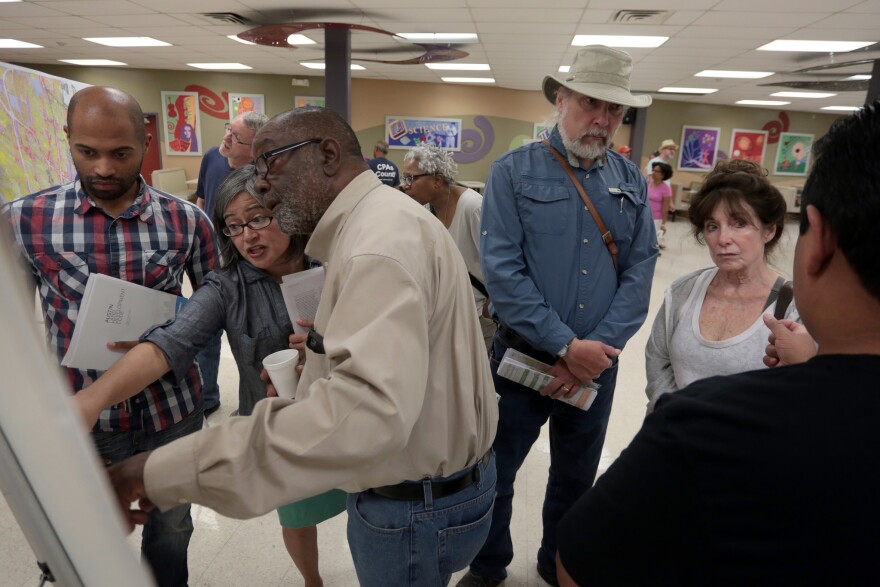Billy Thogersen offered to narrate the scene.
“People are [milling] about, looking at 24-by-48-inch maps of the new zoning, lots of colors and confusing acronyms and codes,” he said in the cafeteria at LBJ High School in Northeast Austin. The room, emptied of students, held roughly 30 community members interested in hearing more about CodeNEXT, the city’s rewrite of its land development code.
Thogersen, who sells real estate, came to be guided through the more than 1,000-page proposal.
“I’d like someone who’s digested this a little bit to explain what they feel the overall impact is going to be,” he said. “And then also get an explanation of what all the new zoning codes exactly mean, what the changes are from the old zoning code, so I can look at how that would impact my little area.”
Since last month, the City of Austin has been hosting CodeNEXT open houses in each city council district. At these public meetings, large maps show the proposed zoning. City staff members sit with laptops, offering to zero in on a resident’s property or neighborhood and help him or her understand the proposed changes.

And that’s everyone's big question.
“How is this going to affect our neighborhood?” Barb Kuplicki, a District 1 resident, asked at one of the open houses.
Kuplicki said she has tried to wade into CodeNEXT on her own and she has even bookmarked several city websites to help with research – to little avail.
“There’s building codes that I personally don’t understand,” she said.
Tracy Witte, chairwoman of the CodeNEXT committee of the Organization of Central East Austin Neighborhoods, said she has been able to work through the new zoning partially on her own – but only because she thinks about zoning in her role on the neighborhood association.
“But I think for an average person who has a real life and does other things all day long, I think it’s probably pretty confusing,” she said.
What’s most confusing, Witte said, is that the city has gone from one set of zoning, or systems for categorizing land and what can be built on it, to three sets. Under the proposal, roughly 23 percent of the city’s zoning is not going to change.
"I think for an average person who has a real life and does other things all day long, I think it’s probably pretty confusing."
“I think a lot of people are finding it really difficult to try to understand how those are going to interact and why do we even need three different ones?" Witte said. "Why don’t we have one zoning code that is applied equitably across the city?"
City staff have characterized the code rewrite as imbuing the current zoning regulations, which were rewritten in 1984, with policy that has been passed since then – including Imagine Austin, which envisions a less car-dependent city.
“CodeNEXT is really being developed to effectuate existing policy,” said Greg Dutton, a senior planner with the city. “So it’s using things like Imagine Austin and neighborhood plans and future land use maps, to use those existing policies for a basis for mapping.”
But when it comes to digesting the proposed changes – or no changes – at home, people like Kimberly Johnson simply feel overwhelmed.
“I’m just trying to take it all in to understand what CodeNEXT is really all about,” she said. “I’ve just been hearing a little bit, but I don’t know enough of it to understand how it’s going to impact me and where my say and opinion matters.”
CodeNEXT open houses continue this week, with a meeting in District 4 at Hart Elementary School on Wednesday night.





